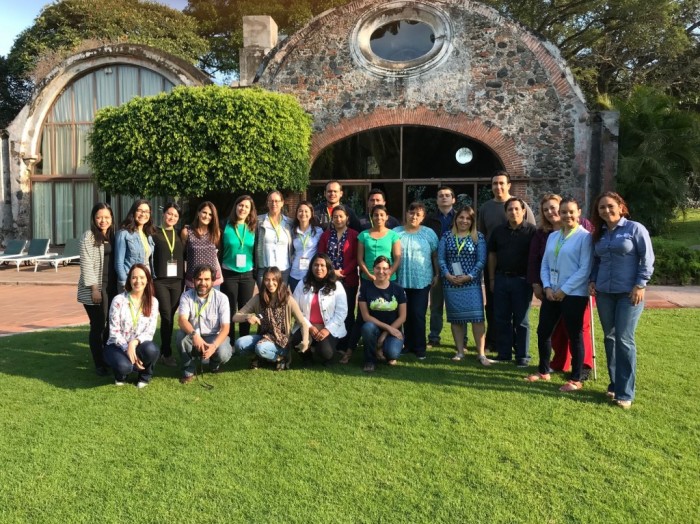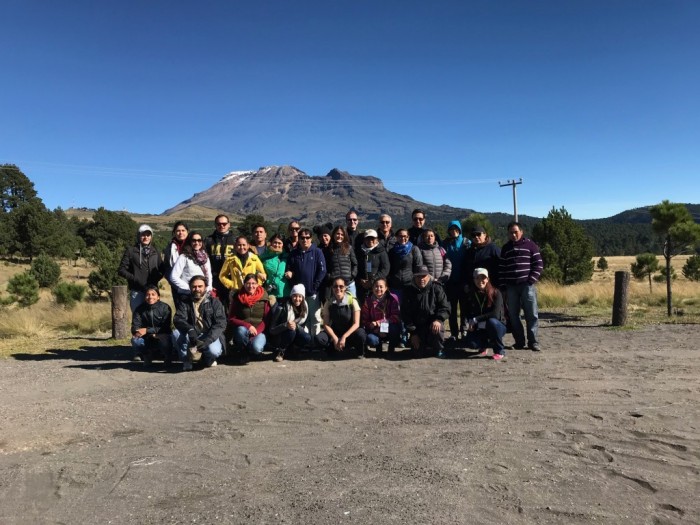In order to reinforce key players’ knowledge of how to mainstream the approach of Ecosystem-based Adaptation (EbA) in public policy planning and implementation processes, an intensive training was held in the “EbA School for Agriculture and Tourism Sectors”.
Intensive training on EbA (Autumn School) is significant for generating interest in the EbA approach demonstrated by Mexico in different national climate change policy instruments, as well as interest in the country’s Nationally Determined Contribution (NDC), which was presented within the framework of the Paris Accord. Within this context, the EbA School consisted of 11 sessions with group activities and different conferences by experts on national policy themes regarding climate change, agriculture, tourism, and cooperation with the private sector. The combination of these activities and presentations enabled participants to acquire technical and practical tools for implementing the EbA approach. In addition, through hands-on exercises and analysis of a case study, the training helped the attendees to identify areas of opportunity for the EbA approach towards the developmental goals of the agriculture, tourism, and environmental sectors, particularly those that are in line with Mexico’s NDC.

The training was organized around five modules:
- Introduction and basic EbA concepts: During this first module, participants identified the importance of ecosystems and biodiversity with respect to national climate change policy.
- Vulnerability and risks due to climate change: implementing the knowledge acquired in the first module, the participants addressed the theme of vulnerability and risk in implementing Mexico’s NDC commitments in the agriculture and tourism sectors. Additionally, indicators were defined for measuring the vulnerability, climate impacts and threats in those sectors.
- Vulnerability and adaptation options: During this module, participants visited the Iztaccihuatl-Popocatepetl National Park. The focus of this field trip was to identify climate and non-climate impacts that affect the region, which helped the participants create a broader perspective of the case study. Besides gaining knowledge of the area, they had the opportunity to interview farmers, regional tourism service providers, and personnel from the National Commission of Natural Protected Areas (CONANP).
- Prioritization and planning of the EbA implementation measures: In this module, the participants addressed the difficulties for implementing EbA measures, which allowed them to learn how to define the criteria for prioritization.
- Financing and monitoring EbA: The last module covered two important areas. First, the participants gained knowledge of the important challenges represented by monitoring EbA measures, and they identified the basic criteria for selecting monitoring and evaluation indicators (M&E). Secondly, the participants recognized the importance of having financing methods, and they developed different strategies for obtaining them.

During the Autumn School, experts shared their experiences regarding the implementation of the EbA approach. Ninel Escobar, Climate Change Coordinator at the World Wildlife Fund (WWF), presented the case of Water Reserves as a national EbA measure that is supported by the private, social, and public sector in Mexico. Furthermore, Ronald Ontiveros shared the research that has been conducted by the Mexican Institute of Water Technology (IMTA in its Spanish-language acronym) on the subject of vulnerability and water availability projections for the agriculture sector. Finally, Gabriel Perez, representative of the National Industrial Association of Colombia (ANDI in its Spanish-language acronym) and Andrea Zapata, GIZ consultant in Colombia, shared their experiences regarding collaboration with the private sector for implementing EbA measures in Cartagena, Colombia.
Along with the ToT (Training of Trainers) course, around 50 authorities successfully completed training, which will allow them to pass on the training to others. They are able to contribute to nurturing institutional and professional capacities in order to consider and utilize the potential of sustainable use of ecosystems and their vital services for Mexico’s adaptation efforts.
The EbA Autumn School was held from October 23-27, 2017 in Hacienda Cocoyoc, Morelos, Mexico. It was taught by the Deutsche Gesellschaft für Internationale Zusammenarbeit (GIZ) GmbH on behalf of the German Federal Ministry for the Environment, Nature Conservation, Building and Nuclear Safety (BMUB) in collaboration with Mexico‘s Ministry of Environment and Natural Resources (SEMARNAT), the Mexican Institute of Ecology and Climate Change (INECC), and the Mexican National Commission of Natural Protected Areas (CONANP).
